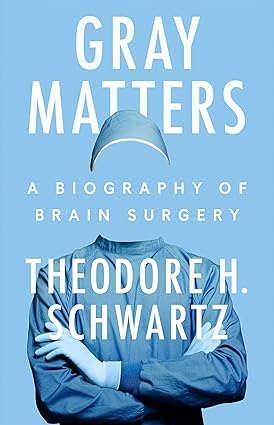In this fascinating edition of The Frontier State Dialogues, I host Dr. Theodore Schwartz, pioneering neurosurgeon at New York City and author of "Gray Matters: A biography of the brain". Our wide-ranging conversation explores the intersection of surgical innovation, brain science, and emerging neurotechnology, with particular focus on what current brain-computer interface development means for the future of human enhancement and medical treatment.
Brief biography of Theodore H. Schwartz:
Theodore H. Schwartz (Harvard College '87, Harvard Medical School MD '93, FACS) is the David and Ursel Barnes Endowed Professor of Minimally Invasive Neurosurgery at Weill Cornell Medicine, one of the busiest and highest-ranked neurosurgery centers in the world. He has published over five hundred scientific articles and chapters on neurosurgery and lectured worldwide—from Bogotá to Vienna to Mumbai—on new, minimally invasive surgical techniques that he helped develop. He also runs a basic science laboratory devoted to epilepsy research. He studied philosophy and literature at Harvard College before studying neuroscience and neurobiology at Harvard Medical School.
Through a 90-minute conversation, we delve a bit into Dr. Schwartz’s compelling memoir, Gray Matters and discuss brain-computer interfaces, the philosophical debate of ‘free will’ and whether it exists, and some related questions and thoughts as we advance our understanding of the human brain.
This unfiltered Dialogue will explore these themes with a backdrop of the intricate world of brain surgery, offering insights into the profound experiences and challenges faced by one of the leading figures in neurosurgery.
Dr. Theodore Schwartz, celebrated for his pioneering work and innovative techniques in brain surgery, discusses some riveting stories behind his book, which provides a candid look at the highs and lows of his career. From groundbreaking medical procedures to the personal and emotional aspects of his profession, Gray Matters offers a unique perspective on the human side of neurosurgery.
Key Themes
Our 90-minute dialogue explored several crucial aspects of neuroscience and technological innovation:
Surgical Evolution: From 50% mortality rates in early brain surgery to today's minimally invasive techniques, how neurosurgical innovation offers crucial lessons for technology development in high-stakes environments. Dr. Schwartz's firsthand experience developing endoscopic approaches illuminates how medical innovations actually emerge and gain acceptance.
Brain-Computer Interface Realities: The biological challenges and surgical complexities that may impact BCI development, viewed through decades of hands-on brain surgery experience. Dr. Schwartz offers unique insight into competing approaches from companies like Neuralink, Precision Neuroscience, and Synchron.
The Philosophy of Mind: How split-brain studies and modern neuroscience challenge our understanding of consciousness, free will, and the nature of self. The implications of these insights for human augmentation technologies.
Clinical Translation: The gap between theoretical possibilities and practical implementation in brain intervention, particularly highlighted through discussions of memory enhancement and neuroplasticity.
Looking Forward
Dr. Schwartz shared valuable insights about both the promise and limitations of emerging neurotechnologies, particularly emphasizing that getting information out of the brain may be easier than putting information in. His surgical experience provides crucial perspective on the challenges facing brain-computer interface development, while his patient stories illuminate human elements often overlooked in technical discussions.
Particularly interesting was his take on how BCI companies should approach development - emphasizing the importance of close collaboration with practicing neurosurgeons rather than trying to develop solutions purely in engineering labs. He sees enormous potential for helping patients with conditions like ALS or paralysis, while remaining thoughtfully skeptical about near-term enhancement applications.
This conversation marks an important examination of how medical innovation occurs in practice and what lessons it holds for emerging neurotechnology development. Through comparing approaches across different regions and times, we gain crucial insights into how transformative technologies actually emerge and evolve.
Stay tuned for more insights from The Frontier State Dialogues series throughout 2024, as we continue to explore the intersection of technology, policy, and innovation.













